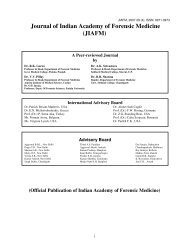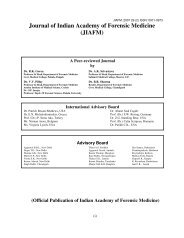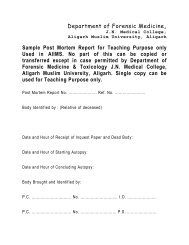jiafm, 2010-32(2) april-june. - forensic medicine
jiafm, 2010-32(2) april-june. - forensic medicine
jiafm, 2010-32(2) april-june. - forensic medicine
- No tags were found...
You also want an ePaper? Increase the reach of your titles
YUMPU automatically turns print PDFs into web optimized ePapers that Google loves.
ISSN 0971-0973 J Indian Acad Forensic Med, <strong>32</strong>(2)Materials and Methods:A study was conducted at the KalingaInstitute of Medical Sciences Bhubaneswar in themonth of January & February <strong>2010</strong>. All the doctorsof the clinical departments were approached and total120 are included in the study. Those who were onleave, refused to participate and those who were notavailable on the third visit were excluded from thestudy. A structured, self administered questionnairecontaining 19 items relating to awareness andattitudes to medical ethics was devised and pretested.An analysis was carried out for the questionsby categorizing them into either the “yes" or the “no"and "can‟t say /don‟t know" answers. Permission toconduct the study was obtained from the instituteauthority. Oral informed consent was taken from eachrespondent. Confidentiality was maintained.Observation:In this survey total 120 numbers ofpracticing clinical faculties of various clinicaldepartments of Kalinga Institute of Medical Scienceshospital are included. Answering the questions aboutthe awareness regarding the medico legal cases 90%of the participants said that they are well aware aboutthe medico legal cases and 82% of the total studygroup said that they are taking precautions whilehandling medico legal cases (Table No.-1).Responding to the questions about the medicalethics (Table No.-2) 100% of the participants favoredan ethical practice but 12% of them are practicing asper the demand of the situation.68% of therespondents strongly disagree with the dichotomy inmedical practice,52% of the participants haveknowledge about the MCI‟s code of ethics 2002 andlittle more than that i.e. 57% are aware of the role ofethical committee in their institute, 54% of theparticipants have suggested that the code of medicalethics should be modified with the changing scenarioof law in relation to medical practice.When answering the questions relating tomedical negligence and related affairs (Table No.-3)82% of the participants are well aware to the factsthat what makes a practitioner negligent in the viewof the patients and 85% of them are taking properprecautions to prevent the litigations. Though 84% ofthe participants believe that proper consent anddocumentation can prevent a charge of negligencestill 20% of them are either not taking or reluctant totake proper consent before any examination orprocedure. About the rights of being a registeredmedical practitioner (Table No.-4) 43% of the totalstudy group expressed their view that using “REDCROSS” emblem is the right of a doctor and 69% ofthem strongly agree that inclusion of medical practiceunder the purview of CPA has made it defensive<strong>medicine</strong>.In spite of an increasing trend of litigationsand compensation suites against the practitioners,only 35% of the total participants have insured themselves and 16% of them are ignorant about the selfinsurance in practice. Responding to other variousaspects of medical practice (TableNo.-5) 68% of theparticipants stated that they are not aware about theinternational format of Death Certification,85% ofthem strongly opposed euthanasia in medicalpractice.88% of the respondents expressed theirpositive desire that 15 days duty in the Department ofForensic Medicine should be made mandatory duringinternship to handle the medico legal cases properlyin future professional life and all of them (100%)have shown their eagerness to attend the CME inrelation to medico legal cases and medical ethics ifconducted in regular intervals.Discussion:During the survey of 120 faculty membersfrom clinical departments of KIMS it was observedthat 10% of them are not sure of identifying themedico legal cases they come across and 18% don‟tcare to take any precaution while dealing with MLC.Although every one in the survey are in favor ofdoing ethical practice 12% deviates at times. Takingcommission although became a regular phenomenonin all other professions still it is considered asunethical on the part of a RMP as per the MCI guidelines. About half of the respondent doctors had"heard" and even "read" the Code of Ethics. Thiscould be because the respondents consulted theircolleagues or read the code between the time theyreceived the questionnaire and the time that theyreturned the completed questionnaire. However,questions on specific sections of the Code of Ethicsreceived fewer correct responses, indicating lack ofin-depth knowledge about medical ethics. Thoughnearly 57% knew about an ethics committee inKIMS, very few knew about the role played by thecommittee. This could be because of the very limitedrole played by the ethics committee in the institute.The committee looks after ethical issues ofresearch only. As it is highlighted 18% are not awareof their activities which can prevent them fromnegligence and 7% knows very little. As such 15%are not able to take any precaution in preventingcharge of negligence. 20% of them don‟t know thatjust taking a consent and proper documentation willbe much more beneficial in preventing litigations.Even when more than half the respondents areunaware about questions on self insurance andwhether doctors were covered under the ConsumerProtection Act, their responses could not beconsidered satisfactory as such things should beknown by all doctors.154


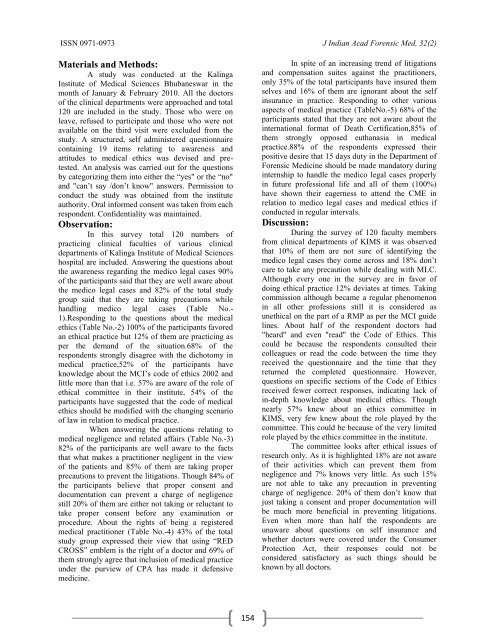
![syllabus in forensic medicine for m.b.b.s. students in india [pdf]](https://img.yumpu.com/48405011/1/190x245/syllabus-in-forensic-medicine-for-mbbs-students-in-india-pdf.jpg?quality=85)
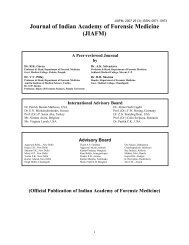
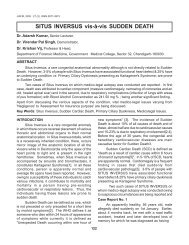
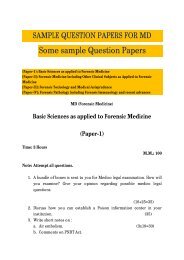
![SPOTTING IN FORENSIC MEDICINE [pdf]](https://img.yumpu.com/45856557/1/190x245/spotting-in-forensic-medicine-pdf.jpg?quality=85)
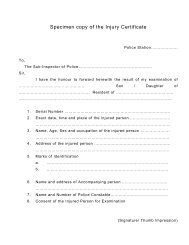
![JAFM-33-2, April-June, 2011 [PDF] - forensic medicine](https://img.yumpu.com/43461356/1/190x245/jafm-33-2-april-june-2011-pdf-forensic-medicine.jpg?quality=85)
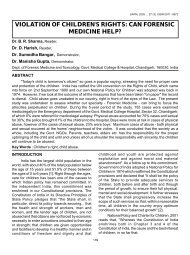
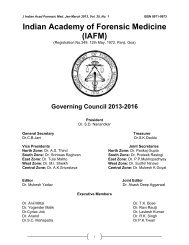
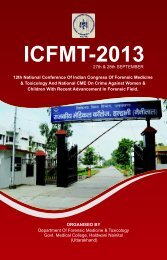
![JIAFM-33-4, October-December, 2011 [PDF] - forensic medicine](https://img.yumpu.com/31013278/1/190x245/jiafm-33-4-october-december-2011-pdf-forensic-medicine.jpg?quality=85)
